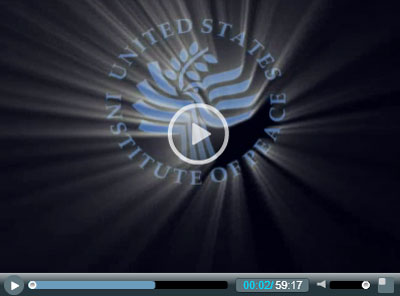Former Rep. Jim Marshall Becomes USIP’s Fourth President
Former U.S. Congressman Jim Marshall became the fourth president of the United States Institute of Peace (USIP) on September 14, taking the oath of office and telling an audience at USIP’s headquarters in Washington, D.C., that he and the Institute’s staff are committed to the mission of “peace for the United States and for the world.”

Former U.S. Congressman Jim Marshall became the fourth president of the United States Institute of Peace (USIP) on September 14, taking the oath of office and telling an audience at USIP’s headquarters in Washington, D.C., that he and the Institute’s staff are committed to the mission of “peace for the United States and for the world.”
“I’m delighted to be on board,” he said.
Marshall, a Democrat with strong ties to both sides of the political aisle, represented the congressional district around Macon, Georgia, from 2003 to 2011 in the U.S. House of Representatives, serving on the House Committees on Armed Services, Agriculture and Financial Services. He also served as the mayor of Macon from 1995 to 1999.
A business and finance lawyer, Marshall was a law professor at Mercer University in Macon for 16 years and taught at Princeton University in 2011. He is also a decorated combat veteran of the Vietnam War, having served as an Airborne-Ranger reconnaissance platoon sergeant in the U.S. Army. In 2006, he was inducted into the Army Airborne Rangers’ Hall of Fame.
Marshall is a 1972 graduate of Princeton and earned a law degree from Boston University in 1977.
In his September 14 remarks, Marshall referred to the USIP presidency as an opportunity “to make a contribution.” The son and grandson of Army generals, he recalled a family history of American military service dating back to the Revolutionary War. With the beginning of his leadership at USIP, he observed, “I would say that the Marshall family is trending in the right direction.”
Marshall was selected by USIP’s Board of Directors in July. He succeeds Richard H. Solomon, a U.S. ambassador and senior State Department official who led the Institute as president for the past 19 years. During that period, USIP evolved from a small educational and analytical organization into an operational agency with offices in Kabul and Baghdad, as well as a presence in Pakistan and Libya. The other past USIP presidents are Robert F. Turner (1986-87), a University of Virginia constitutional and national security law professor, and Samuel W. Lewis (1987-92), a former U.S. ambassador and Middle East specialist. All of the previous USIP presidents attended Marshall’s swearing-in ceremony.
Created by Congress in 1984, the Institute is the nation’s independent, nonpartisan conflict management center and works to help prevent and mitigate international conflicts without resort to violence. A quasi-governmental agency, USIP plays a leading international role in training, education and implementing programs to manage conflict through nonviolent means and maintain peace in post-conflict settings.
Marshall was introduced by J. Robinson West, the chair of USIP’s Board of Directors. West said the former Congressman was seen as “as a leader who could take the Institute to the next stage in its growth and development.”
Rep. Emanuel Cleaver II (D-Mo.), a Congressman from Missouri and the chair of the Congressional Black Caucus, delivered an invocation and later administered the oath of office. Cleaver called Marshall “what is becoming a rare breed of members of Congress—and that is a moderate,” adding, “His spirit is a spirit of peace.”
The event also featured a tribute to Solomon, who guided the Institute into an array of peacebuilding and conflict management activities in international conflict zones and in the development and opening last year of a headquarters building on the western end of the National Mall and near the nation’s war memorials. USIP Board of Directors Vice Chair George E. Moose credited Solomon with an “inspiring vision” for the Institute’s programs and architecturally acclaimed building.
In his address, Marshall took note of the week’s tragic violence at U.S. diplomatic facilities in North Africa and the Middle East, particularly the attack on the U.S. consulate in Benghazi, Libya, that claimed the life of Ambassador J. Christopher Stevens and three other U.S. personnel.
He recalled an experience as mayor of Macon he had in securing the removal of a high fence topped by barbed wire that had separated a public housing project from Mercer University—a fence that sent, he said, “absolutely the wrong signal.” He added, “It’s the sort of thing on a small scale that you would hope we could do globally: Take down barbed wires, and substitute for that understanding and some peaceful, positive relationships.”
The new USIP president also quoted reflections on the nature of peace from a range of historical figures, including Albert Einstein, Presidents John F. Kennedy and Dwight D. Eisenhower, Napoleon, the 14th Dalai Lama and Indira Gandhi.
At USIP, Marshall drew on his 2008 Law Day address at Mercer University, a speech in which he appealed for better integration among already interdependent peoples through “education, negotiation, compromise, complicated international agreements, and legislation, plus the development and use of effective, non-violent international processes for dispute resolution…throughout the globe.”
Those attending the swearing-in event included Marshall’s wife, Macon lawyer Camille Hope; members of Congress; former and current senior U.S. officials; and foreign diplomats based in Washington.





